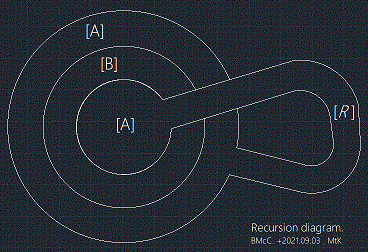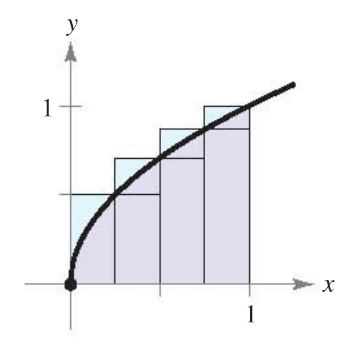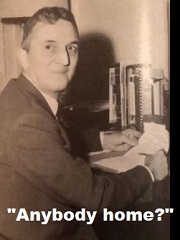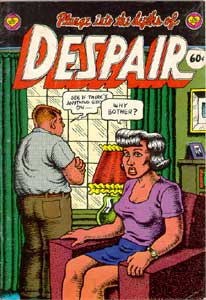Vivere est ludere!
"If you are not playing, you are less than living!" (BMcC[18-11-46-503])
Unfortunately, playing is not always fun. The present website is an example: everything I (BMcC[18-11-46-503]) do here is play. I'm not making any money off it or getting any publicity from it (although I would like to get either one and, better, both!!!). But it's often very frustrating and discouraging because Wiki is not a good toy to play with:
The things I want to play with using Wiki, instead of Wiki facilitating them, it frustrates me accomplishing my objectives. I have to slow down and even stop my creative process to have to waste my life-time and energy fighting with my Wiki to get it to do not what I want but just what I an minimally make do with to be able to proceed further. I keep trying one way and then another way to just get my minimum I am willing to settle for, not at all of what I want, using Wiki. Wiki is stolid, doltish, boorish, discouraging, depressing, whereas it should be illuminating, lucid, enchanting to use. Wiki should be inspiring me; instead it is perspiring me, and I curse it and the techies who made it ever day.
Why don't you Wikitechies get "hip"? Of course I should be thankful that I have anything at all to play with and am not being tortured in the Lubyanka. Things can always be worse, can't they? Contrast with Wiki: APL, where the funky special symbols (example, right) were like friendly little cartoon animals that wanted to play with me. Or SGML, where the structure I was using was "industrial strength", not wimpy-washy like the HTML web world has become.
Playing is beyond Being
Plato and Emmanuel Levinas say The Good is beyond Being, and surely that is true: All that which is and its transcendental context are just there: somehow they fell from the sky or God knows where and What the hell is God, either?, and that does not provide any warranty they are any good. The Good must be something which passes critical judgment, which latter is not so simple, since: Is the judgment part of what is being judged or not?. But play is beyond Being, too: Play imagines something which was not there; it brings into Being beings which were not there before, and it can even play with Being itself, not just be part of it. My universal diagram for the recursive paradoxicality of human living as opposed to just dolt metabolizing like Mr. Dialtone☏, and other philosophical issues:

Here is another diagram I have drawn, with frustration and difficulty, with Autocad. Example usage: For "A", substitute: Yourself. for "B", substitute: The world. For "R" substirute: includes. Proceed inward from the largest ring.
Which leads to the idea: I do not have and do not want to have any "identity". Identity is something being the same as itself. But in the diagram,what is itself is also two levels removed from itself: There is not an identity but raher a paradoxicality, and if one wants to call something which is different from itself qua being different from itself an identity, that' a grammatically correct sentence, but what exactly does that mean?
Furthermore, because play(imagination, new a new way of looking at something, etc.) changes the world, I am not identical now towhat/who I was before, so, in this direction, too, I am not identical to myself, so I don't have an identity, again, unless that "identity" is to be always changing.
The meaning of the river flowing is not that all things are changing so that we cannot encounter them twice but that some things stay the same only by changing." (Heraclitus)
To play is to get beyond all beings, andto have a perspspective on Being itself, too, which is in some sense to be beyond it even if I am also nonetheless in it (the paradoxicality).
All what exists is raw material
All that which exists is raw material for playful, creative endeavor. Of course this is not completely true, so let's set bounds at once: I don't know about you, my reader, but I would not play with a cancer tumor or with getting myself out of a burning building. I call such impingements on my creativity: "pragmatic agenda": things that need to be dealt with, Or else!. I resent them; I disdain them; I want them to just go away. But if I can't do anything about them then I need to deal with them. People do not like it, but I try to get any suchimplingment out of the way ASAP. "You don't have to do it now, Bradford>" But if I've got to do it sometime, I con't want a dead weight hanging around my neck distracting me from creating something. So, goddamn it, let's get the damned thing out of the wan and been done and gone and good riddance ot it and to whatever, whoever caused me to be impinged by it!
Now we can tuen to the fun things. I think there is alot of truth to the dicta Art Appel had posted on his office door in IBM Research in the 1980's:
Three things are not possible:
The desire of the rich to have more.
The desire of the sick for something different,
And the desire of the traveler to be any place but here.
On the other hand, consider the case of a certain prisoner in Alcatraz who was locked in an empty cell in total darkness for several months without knowing when he would be let out – not out of prison, but out of that cell. He kept himself from going insane by ripping one button off his prison uniform and repeatedly tossing it some random place in his cell and spending hours crawling around on the cell floor trying to find it again, and then starting the whole thing over yet again.... Wouldn't it be reasonable if I (you, my reader) was him, to want more of something different some place else?
Cannot we generalize: Some places are better to be than others? Better to be in teh library in th film "The Garden of ht Finzi-Continis" than in a Dunkin Donuts store, yes? Bbetter that I an look thru a book of Breughel paintings than watch Fox News, yes? The suburban split-level house I wa stuck in as a child wa not conducive to my creativity, especially with an intrusive mother and an "organization man" father. I needed to be childreared in The Garden of the Finzi-Continis or some similarly nurturing place. Maybe, being more realistic, suppose my fathe had had a mall printing shop where I would have got involved with producing printd material and been able to slip in my own stuff to print between work orders, like I used the corporate computer in IBM?
Suppose I had gone to a school where they did not keep impinging on me. A school where I was taught reading, writing and arithmetic, not pegagogishit. Reading? The New York Times newspaper. The philosophical fragments of Heraclitus. Books about how repressive childrearing hurts the child, e.g.: Alice Miller's "The drama of the gifted child", "Thou shalt not be aware" and "For your own good". Writing? Each day have me write about something that happened to me that day that was interesting enoug hfor me to write about it, or, alternatiely, for me to write why there was nothing in my day worth writing about. Now revise it and make it better. Arithmetic? No memorizing of multiplication tables. In the 7th grade I still counted on my fingers, but I also did my math assignments in indelible ink not icky pencil and I got "A" grades. Algebra, OK, but not being tortured with stuff that I could not understand why I had to do it except to get a good grade to pacify teach. I think by age 12 years I ould have understood Calculus if it was spoon fed to me, or if i had a really really really good textbook. Then! once I understand it, have me write up what I understood in such detail that what I wrote could be used to teach it to somebody else. No tests. Not "homework". Just pure learning. How about latin? Not threatening me with bad grades for not memorizing and vomiting back shit for teach, but just learning the grammar and substituting the vocabulary words, in leidured peace and safety. And I could walk outside and breathe the air whenever I wanted, and have a clean, single occupancy toilet to use for my bodily functions. And yes, they could also have taught me how to pleasure myself (that's a more proper description for for what prigs derogatorily call: "masturbation"), and even have seen to it that there were girls at my level of intellectual and spiritual ("Geistige") development for me to enjoy being with. They could have had me teaching younger children. Ther were all sorts of thing smy social surround could have done to nurture not stifle me, and many of them would not even have cost anybody a lot of money, would they? All thatwould hav ebeen required would hav been for them to not be stifling, self-important prig dolts, which maybe was mcuh too much to hope for in The Unitd States of help keep Amereica beautiful get a haircut America and then the Seletive Service Sysetm America of the 1950's and 1960's.
"They put me off at the wrong stop wnen I was born." (Doug Schaff, and me, BMcC[18-11-46-503])
Maybe I guess I am asking for the sun and the moon and the stars: to be respected as a peer by the adults, not jerked around and told what to do and punished if I displeased people who did not respect me. Today at age 75 years I like to play catch the expired catnip mouse with my pet cat. That's far beyond anything in my childrearenders' cranium cavities.May I have some tuning forks, please ding your skull bones, my parents and teaches, to find your resonant frequencies? And I could order you all by ascending ㎐. Don't you all think that's a pretty imaginative idea, you → anybody home? Why was I stuck with these dolts?
People
It seems to me that my parents and perp school teachers did not have an honorifically imaginative life. If by "imagination" we intend only a faculty of holding in view images, for instance the person taking a dollar bill out of their wallet and looking at it and recognizing it as a one dllar United States Federal Reserve banknote, then these people taxonomically had imaginations, like they also had toenails.
My mother
My mother is an interesting ase. She was an idiot savant artist. With maybe a 6th grade education and certainly no artistic training or anybody in her social surrond who did anything "artistic" she produced many what we would all artistic products. She could draw anything, including a person's head fro probably any angle. She could do "silhouette" cutouts. She made posters of flowers etc. by cutting the shapes out of "colored paper". But she never engaged in imaginatie play with me. I vaguely remember that in my first iteration of the first half of the 6th grade, ther was a class project for us students to "make something". She whipped up a very good drawing of Edgar Allen Poe's house for me to have done which of course I had not done. But I think she did this as a realistic project: Her child had to submit something "he made" for class, and this was what it was going to be. She was a puzzle. Up until agou tthe 6th grade, in the summers she would buy extra teaching materials from the school book supply seller ("Cokesbury books?"), and make me do the workbooks. I think she stopped doing this when she ceased to understand the assignments. What went on in her head?
Each year at Christmas time, everybody in the neighborhood where we lived "decorated" their house. Many were garish. My mother spent hours peeling th paint off little bulbs for electric candles to put in the windows of our house because they did not sell clear Christmas candle bulbs then. And we didn't have a zillon electcir candles in each window; mostly a single candle per window. This was a kind of "less is more" sensibility, rarely seen on any other family's house. It seems to have exhibited a sophisticated esthetic. But it was a dead end. She would do something "creative", and that was that.
My father
My father was a different story: He did not make anything artistic, period. He sold housepaint wholesale, and then managed paint salesmen. He was very good at these practical activities. Lter in life he exercised a kind of imagination: transforming himself into what he imagined a successful businessman to be. I imagine he had an inner life of practical planning and executing the plans he would make. Planning is a form of imagination. Reading an article in a trade journal about one's product area which suggests a better way to go about selling the product is also a kind of imaginative act. My father imagined me being a Yale graduate nefore (and after) I was one. He had my diplomas framed professionally and hung them on his office wall almost as if they were his, and in a way they were and I do not begrudge him a moment of any satisfaction, i.e., imaginative identification, he got out of it, because he never had the opportunity to graduate from any college himself, although he was intelligent enough.
More generally

To have "an inner life" is to imag-ine. An image is not some thing marked off (present-ed) in clock time like the objects in the individual frames of a time lapse photograph series, but rather a temporal presenc-ing which is "on its way" ("Unterwegs"). There need not, however, be anything imag-inative in this.

Why is the Muybridge "frame" sequence the better of the two examples here? Because it removed the background or occontext and which in the picture of the sun, persists as a continuum. For the horse pictures, there is no, zero connection between the moments whatever: each moment is totally disontinuous: "instantaneous", which is what "people's image of physical motion is, yes? Each momentreplaces the previons and is replaced by the next; they do not flow into a continuum of furure into present into past. The moments are sort of like playing cards: one could reprder time by reshuffling the deck of them.

Reality is just he current pathology slide in the limit graph (above). yes? Better products for better living through chemistry (or whatever...) enable us to make the slides ever thinner so that they have ever less temporal "extension" opacity, yes? Everything is spatial. The current universe-card just gets keeps being replaced by the next in Fotruna's deck of cards. The cards are all already shuffled, just waiting to be dealt out by Fate. Gimme "The Net". Why bother? Here comes the school bus for another day of classes: Climb aboard, kids! Time to go to work in the office for another day, ywan.
But authentic play is not predictable
I did not have any idea how the present web page was going to develop until I'm in the living "here and now" of working. i.e.: playing, on it. Why did my childrearers and others throughout my life eithe want to or just in fact keep stifling me under "reality", a reality which only in small part would ever have existed had they not cooked it up to burden me with, whether intentionally or just a collateral damage from it. They can't create anything so they need to make work to generate the surplus value for them to be able to go amuse themselves for a while in Disneyland. Vacations cost a lot of time and energy. In contrast, ow much time and energy did it take for Mr. Duchamp to write: "L.H.O.O.Q." on a Mona Lisa postcard? A fundamental law of human nature: The less creative, i.e.: the more dolt you are, the more energy you have to expend to keep from being bored to death. People need their unsurprising "surprise endings".
Could I have created anything as a child? The whole trajectory of my life has been trying to become creative, except for the dcade or so when I was dumbing myself down to try to endure my last job and losing my mind to that endeavor and wishing to be dead. Some capitalization would have helped by letting me walk away from it and into "the open". "It's no big deal, Brad." I was/am no big deal, and I always remember this.
My parents didn't have a clue. My perp school teaches were like Annnie Dillard's giant waterbug in "Pilgrim at Tinkers' Creek" that injects a frog with its venom which liquifies the poor creature's innards and then the giant waterbug drinks it all like a milkshake thru a straw, leaving just an empty deflated frog skin behind, something like a used condom. I was childreared in a kind of Truman Show where all the air escaped from the vault of heaven: Pffut! Eine Scheißestückwelt.
Playing: A softball game and an army assignment (Prof Louis Forsdale)
I begin by repeating Professor Forsdale's story about a softball game one summer at Black Mountain art school. The students were goofing around ~sort of~ playing softball, but not trying to keep score, nobody winning or losing, just having fun together in the context of a baseball field and the game of softball as raw material for having fun. Then, he said: somebody decided to take it seriously and try to win. Everybody got serious about winning, and "it turned ugly". Now there were going to be winners an losers. Of course, at the deep level of the structure of human existence there was imagination still going on: each persona was imagining how to get ahead in th game, say by throwing or hitting the ball a certain way. So too a torturer imagines the future screams of his victim.
There is also the story of Forsdale's assignment as audio visual aids coordinator at the Army War College during World War II. He was the lowest ranking person in the place. the General in command held a meeting in which he introduced "Lieutanant Forsdale" to everyone and explained that anything the Lieutenant said should be taken as if he himself had said it.
And a third Forsdale story: He liked to take photographs. One time when he was leaving Iran, the Shah's security agents get interested in his pictures and wanted his film. What would a wholly serious, realistic person have done? Obviously, try to hide it. But Forsdale came up with a clever idea: He took a roll of film out of his camera and ceremoniously unspooled and exposed to the light the whole thing in front of the probably slightly astonished security agents. See, all gone! And he flew out of the country with his pictures. It was an unexposed film canister.
Moral of these three stories: Give a person the power to manage his (her, other's) own activities proactively, creatively, and let them do what they want, not just be serious about everything.
My parents were realistic, or at least my father had to be to "earn a living", as self-capitalization is called, even though it's not always very "alive". The situation with my mother was less clear: Did she or didn't she, what? I never much asked either of them anything. For my father , the answers would have been pretty obvious and really realistic: selling housepaint to hardware store managers. He had an imaginative product even: Back in the days where every can of paint had a predefined color, he was selling the first system to enable the dealer to dynamically turn a single kind of paint an into just about any color, at great savings in store inventory, obviously, as if shoes stores didn't have to stock different sizes of shoes to accommodate the differing sizes of feet. But I really have no idea what could have gone on in my mother's head. Today I wonder what would have happened if I had asked. They did "play": card "games". It was a Potemkin world for me, and sometimes literally: I remember once riding my bicycle down a street and looking at the houses' fronts as if there was nothing behind the facades.
Contrast that with some parents who were clueless but not clueless about their being clueless. Dirt farmer parent of a highly gifted child. Since thay could not help him much in the first-order sense of providing educational materials and such, they did what they could. They basically told him he'd have to figure it out for himself but that they were there to have his back:
"Tom, do what you believe is right. You will make mistakes. We stand behind you."
The only thing behind me was an Or else!. The one time I did get a "C", in 12th grade Physics class, my two parents explained to me that it would not happen again, not: Let's see why this happened and how we can prevent it from happening again. Just: Or else!. Now contrast another person's childhood, the famous conceptual artist (why am I not a famous conceptual artist?) Laurie Anderson:
"At [family] dinner, each child was expected to tell a story of their day – a recitation that could go on indefinitely and include a baffling variety of incidents and styles...." (NYT, "The Shapeshifter", Sam Anderson, +2021.10.31).
[Somehow I fucked up here and lost an hour's typing; how much of it is it worth trying to repeat, like vomiting up dinner to eat it a second time? I abominate having to redo anything as being an unnecessary and inappropriate imposition on me: The damned thing should just be done itself the first time and me be done with it to be able to go forward with improving it further or doing something else entirely different. Period. ~ My childhood oppression taught me to not tolerate having to repeat things. The automatic "select text' function of the Wiki text editor is too enthusiastic for my own good. Probably my cat caused my hand to slip on the keyboard somehow. Slaves should be obedient. The computer should be my slave. Damn Wiki.]
At one point when I was about 9 years old, we had a pet cat for a few weeks. I entirely forget about the cat but I do have a photograph with myself and it in the same picture. My father told me he took the cat to Arthur Godfrey's farm (where he sold paint to the farm staff). In college I learned about Marcel Duchamp's large glass painting: "The bride stripped bare by her bachelors even". Been there, done that (except for the sexual angle which was entirely missing from my banal existence; I was stuck living among people who did not make life worth living for me. What was play for them: playing cards, or, a fortiori, spectating kids playing head-butting body-contact athletic team gladiatorial contests, did not turn me on).
Then there was the annual negative fantasy: During the weeks before Christmas, Santa Claus was watching me like the OGPU, and my mother had a piece of paper on the kitchen wall above the stove where she recorded if I had been nuaghty or nice each day. That was a kind of "play" I did not need
A farmer works plowing his field; do his oxen work, too?.
 Welcome
Welcome





